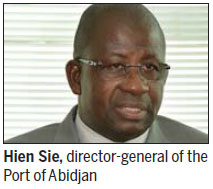Chinese investors find regional anchor in Cote d'Ivoire's main port
Q+A: Hien Sie
Editor's note: The Port of Abidjan, leader of the West African Coast in terms of traffic, handles the vast majority of Cote d'Ivoire's trade, making it the undeniable pulse of the Ivorian economy. The current expansion of the port's terminal capacity by Chinese investors is thus momentous and could reinforce the country's strategic trade position in the region. Hien Sie, director-general of the Port of Abidjan, explains Cote d'Ivoire's plan to become the top trade hub on Africa's Atlantic coast to The Business Report reporter Caroline Vieira Lima.
What role does the Port of Abidjan play in the National Development Plan?
Ivorian President Alassane Ouattara has invested substantially to boost industrial activity since his first election win in 2010. The Port of Abidjan has always been an image of the nation, and is featured as a staple of the National Development Plan because 90 percent of our trade is by sea, with our port handling 80 percent of the country's total maritime volume.
Indeed, the Port of Abidjan's influence is vast: we generate 85 percent of customs' revenue and employ about 60,000 people directly and indirectly, making it the country's most important economic and trade tool, as well as a major industry in itself.

How is Chinese investment impacting the port?
First of all, it's important to note that the Chinese understand the extensive benefits of this investment and that this is not just a project for Cote d'Ivoire, but for the sub-region.
This is why China has made a loan to fund the majority of the expansion for the Port of Abidjan, a project worth a total of $934 million, making it probably the largest Chinese investment in port infrastructure in Africa, as well as the largest China-led project in Cote d'Ivoire.
Ivorian President Ouattara has even called the Port of Abidjan expansion the symbol of Sino-Ivoirian cooperation.
Suffice to say, this investment will have a transformative impact on the Ivorian economy, doubling our port's annual capacity to 2.25 million twenty-foot equivalent units through the construction of a second terminal, scheduled to start operating in 2020.
Chinese financing, led by Beijing-based Exim Bank, will also enable us to widen and deepen the Vridi Canal, and thus allow for the passage of 350-meter-long container ships, increasing the competitiveness of our port through the reduction of shipping fees and higher-capacity facilities.
The concession to operate the second terminal was granted to a French-Dutch consortium. This is just one example of how our National Development Plan is attracting investment from around the world.
How are you positioned against regional rivals?
Abidjan is known as a West African powerhouse and new developments at the port promise to entrench this position.
Currently, nearly twice as many goods transit through the Port of Abidjan compared to our nearest rival.
This industrial activity is, of course, due to our strong sustained economic performance, as well as concentrated development of transport infrastructure around the port, something that is not always the case in other African nations.
How does this vision compare to current trade volume?
The Port of Abidjan has a current capacity of about 750,000 TEUs. In 2015, we managed 22 million tons of traffic.
The next busiest port in the West African region was Dakar, Senegal, which handled 12 million tons of shipments.
What challenges need to be overcome to become a top trade hub?
Investment in the port will attract larger ships and greater quantities of trade, but land-based infrastructure needs to develop in step.
Once again, China is assisting here by backing the development of our highway network, which will link Abidjan to neighboring business capitals, such as Lagos, Nigeria, and Ouagadougou, Burkina Faso.
The Ivorian government is also working to upgrade the rail network, and is seeking both operational expertise and funding.
What do you foresee for the port's future when expansion is completed in 2020?
By 2020, we want to be the main trade hub on the Atlantic coast of Africa. Nigerian harbors will also develop, as well as other competitors, but since ports are a reflection of economic activity, I believe that Cote d'Ivoire has a good chance to lead regional trade.
(China Daily 08/08/2016 page28)








